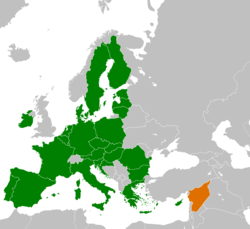Syria–European Union relations
 | |
European Union |
Syria |
|---|---|
European Union–Syria relations are the bilateral relations between the Syrian Arab Republic and the European Union (EU). The European Union (EU) and Syria have signed two agreements between each other. However, due to the Syrian government's crack down on its opposition, the EU imposed an embargo on Syria.[1] Since 2011, the EU has supported the opposition Syrian National Council and calls for the present government to stand down.[2] Since 2012 it has recognised the opposition as legitimate representatives of the Syrian people.[3] Should Turkey's accession to the EU take place, Syria will border the European Union.
As of 2024, several EU member states, including Austria, France, Germany, Denmark, Belgium, Finland, Poland and the Netherlands, have their embassies in Damascus closed.[4] The EU Delegation to Syria remained open until December 2012, when it was for security reasons relocated to Beirut.[5] Syria has a permanent mission to the EU in Brussels.[6]
Agreements
[edit]Between 1977 and 1978, the EU and Syria ratified and signed a Cooperation Agreement which governs relations, which serves as the foundation for EU-Syria relations.[7][5] In 2007, the Country Strategy Paper (CSP) and National Indicative Programme (NIP) were implemented, which shaped the relationship between the EU and Syria up until 2012 and focused on political, economic and social reforms.[8] Despite the non-democratic character of the Syrian government, the EU upheld its trade relations with the state without addressing continuing human rights violations.[8] 2004 and 2008 saw further bilateral agreements between the EU and Syria.[5]
In 2008, Syria also joined the EU's Union for the Mediterranean (and previously the Barcelona Process) and the European Neighbourhood Policy - but did not fully benefit pending the application of the EU-Syria Association Agreement (also includes a Free Trade Agreement) which was signed in 2009, but never ratified by Syria.[9] Since 2011, the Euro-Mediterranean Agreement establishing an Association (EMAA) is frozen. Syria was suspended from the Union for the Mediterranean in 2011.[10][11]
All cooperation programmes and agreements were suspended or frozen in 2011.[12]
Since 2011
[edit]Following the Syrian civil uprising in spring 2011 and the resulting escalation of violence and human rights violations, the EU suspended bilateral cooperation with the Syrian government and froze the draft Association Agreement. Since then, the EU has also suspended the participation of Syrian authorities in its regional programmes. The European Investment Bank (EIB) has suspended all loan operations and technical assistance. The EU established and then expanded targeted sanctions, including an arms embargo, asset freeze and travel ban on government members, and an oil embargo. Syria consequently suspended its membership of and participation in the Union for the Mediterranean. The EU Delegation in Syria remained open until December 2012.[3] In December 2012, the EU accepted the National Coalition for Syrian Revolutionary and Opposition Forces as "legitimate representatives" of the Syrian people.[3]
In 2013 a disagreement between EU member states about whether Syrian rebel groups should be supported, resulted in relieving islamist rebel groups from the arm embargo.[8] The EU's approach towards to Syrian crisis changed in 2014 when the terror organisation ISIS gained power. The EU shifted its focus from the Syrian government towards the fight against the Islamic State due to increasing security concerns. Actions implemented by the EU included humanitarian aid and support for the islamist rebel groups.
Even though the EU states never actively took part in military actions in Syria, they supported already existing rebel groups in Syria and the US-led coalition through financial and material assistance.[8] The EU is a member of the Friends of Syria Group.
Trade
[edit]Before the war, the EU was Syria's largest trading partner with €3.6 billion worth of EU goods exports to Syria and €3.5 billion of Syrian exports to the EU. Total trade was worth €7.18 billion in 2010 and the EU is Syria's largest trading partner with 22.5% of its trade (Syria is the EU's 50th).[13] Bilateral trade has contracted since the war to €1.45 billion in 2013, a drop of 91% of exports from Syria and of 61% of exports from the EU compared to 2011.[3] However, the volume of trade has started to rise in recent years, e.g. in 2018 it was 50% higher than their low in 2016.[14]
Syria's foreign relations with EU member states
[edit]See also
[edit]References
[edit]- ^ Syrian Arab Republic, European External Action Service
- ^ EU takes first step toward recognition of anti-Assad council, EU Observer 10 October 2011
- ^ a b c d "Press corner". Ec.europa.eu. Retrieved 29 July 2022.
- ^ Goldman, Yoel (15 March 2013). "Saudi Arabia, Italy and Holland". The Times of Israel. Retrieved 11 August 2013.
- ^ a b c EU-Syria relations, factsheet, Bruxelles, 14/07/2016 - 23:22, UNIQUE ID: 141215_01
- ^ Ambassador Fu Cong Met with Ammar Al Arsan, Chargé d'Affaires of the Syrian Mission to the EU
- ^ "Agreement details". Council of the European Union. Retrieved 7 August 2013.
- ^ a b c d Kizilkan, Zelal Başak (2019). "Changing Policies of Turkey and the EU to the Syrian Conflict". Atatürk Üniversitesi İktisadi ve İdari Bilimler Dergisi. 33 (1): 321–338.
- ^ Agreements EU delegation to Syria
- ^ "Union for the Mediterranean: time for parliaments to play their role - News". European Parliament. 22 March 2013. Retrieved 18 February 2019.
- ^ "List of Member States of the Union for the Mediterranean". Union for the Mediterranean - UfM. Retrieved 18 February 2019.
- ^ FACT SHEET – The European Union and Syria, EEAS. Published 14 July 2016. Retrieved 30 July 2016.
- ^ Bilateral relations Syria, European Commission
- ^ "U.S. and European Sanctions on Syria" (PDF). Cartercenter.org. September 2020. Retrieved 29 July 2022.
External links
[edit]- EU delegation to Syria
- European Commission Memo on Syria 2014
- "The EU and the crisis in Syria - European External Action Service - European Commission". EEAS - European External Action Service. Retrieved 18 February 2019.

